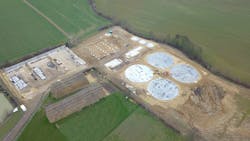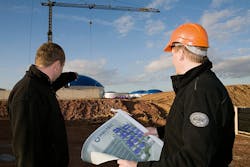Biomethane from wastewater solids to supply 9,600 UK households with energy
GERMANY, FEB 22, 2019 -- In winter 2019, the German biogas plant manufacturer WELTEC BIOPOWER has started building a biomethane plant near Pontefract, West Yorkshire, UK. The client is Lanes Farm Energy, a gas-to-grid project developed by Aqua Consultants. Tel Sultan, director of Lanes Farm Energy said "After in-depth discussions with over ten technology providers, WELTEC was selected to be our partner to deliver the technology." The plant will go live in late 2019 and deliver c7.3 million m³ of biomethane to the UK gas distribution network. This amount of eco-friendly natural gas equivalent is sufficient to supply about 9,600 households with sustainable energy, 24/7.
"The locally sourced feedstocks contribute greatly to the project's sustainability emphasizes Dr. Kevin Monson, Sales Manager at WELTEC UK. Food leftovers account for more than half of the 80,000 tpa of substrate. "Additionally, there is cattle and chicken manure as well as grass silage and hybrid rye", reports Monson. The effective utilization of leftovers is a key reason why Charlotte Morton, Chief Executive of the Anaerobic Digestion & Bioresources Association (ADBA), considers biomethane projects such as the one in Pontefract to be ecologically and economically trend-setting. According to ADBA, the anaerobic digestion (AD) of food leftovers could cover a third of the gas or power demand in the UK and create 35,000 new jobs.
"For a large project such as the one that is being rolled out for Lanes Farm Energy to be successful, a lot of experience, hard work, co-operation and proven technology is required", explains Carsten Hesselfeld, Sales Engineer at WELTEC UK. Under consideration of the substrate structure, the solids are fed through two walking-floor feed hoppers with 110 and 220m³, and two MULTIMix units, which removes foreign objects, liquefies, shreds and macerates incoming solids to make them into an easily pumpable, easily mixed, easily digested liquid. "The mashing and shredding process will make sure that the bacteria can access the substances in the digester faster and will reduce the energy required for mixing", says Hesselfeld. Liquids will be fed in controllable volumes directly to digesters from five pre-storage tanks, of which two are equipped with a stainless steel bottom.
The gas production will take place in four stainless-steel digesters with a height of 8.8 m and an above-average capacity of 6,848m³ each. WELTEC has decided to implement membrane upgrading to transform the biogas into high-quality biomethane. In a separation process comprising several stages, the raw biogas will be refined efficiently without methane slip. In this way, c850 standard m³ of biomethane that is suitable for feed-in will be produced every hour from December 2019 on.
Additionally, the biomethane production will yield digestate, which can be used as high-quality fertilizer, returning organic material and nutrients to the land. For this purpose, it will first be pasteurized and separated. The focus on sustainability is also reflected in these process steps. For example, the pasteurization unit will be equipped with a state-of-the-art energy-efficient heat recovery system. For on-site electricity supply, WELTEC will integrate a 500 kilowatt CHP. The operator will generate additional income from exporting excess electricity to the grid.
Biomethane plants such as Lanes Farm Energy will play an increasingly important role in the UK national energy mix. Compared to coal or oil, the biomethane production from leftovers enables carbon savings of about 90 percent. "With the UK needing to boost energy security post-Brexit, and to re-balance its energy mix to reduce carbon emissions in accordance with the Paris Agreement, recovering clean, reliable biomethane from organic wastes and injecting it into the gas grid is a crucial piece of the energy jigsaw" observes Dr. Kevin Monson and adds: "The provision of sustainable renewable heat and transport fuel from wastes means that biomethane will surely be further promoted by forward-thinking Governments. Biomethane plants are the epitome of the sustainable circular economy. The technology is proven and the gas grid is a ready-made distribution network."

